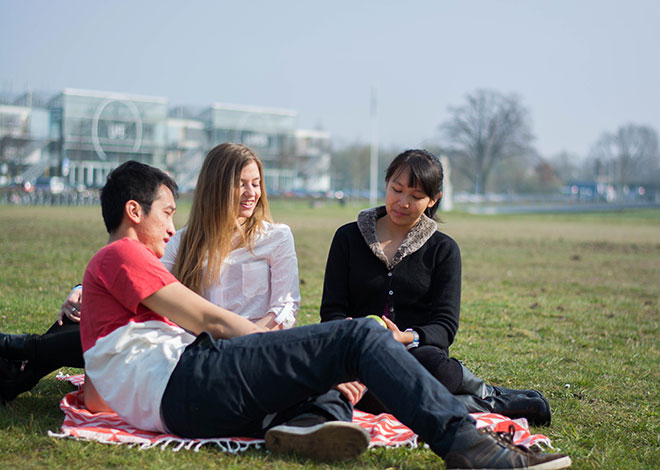Study Compatibility Check: How Does It Work?
The Study Compatibility Check or matching is the last step in the process of choosing a study programme. The current drop-out rate in higher education is much too high. On average, one in three students drops out in their first year. This is a problem for the student, but also for universities and education budgets. Drop-out costs a lot of money. Much effort is therefore devoted to preventing unnecessary drop-out (Dutch version, in het Nederlands).

Drop-out rates at research universities and universities of applied sciences are much too high
Most students who drop out indicate that the reason is a wrong study choice. The study programme did not live up to their expectations. They weren’t motivated enough to complete this particular study programme. Students dropping out are much less likely to indicate that a study programme was too intensive or that the transition from school to university was too difficult.
The Study Compatibility Check is intended to reduce drop-out rate. But does it work? To find out, the Minister commissioned research on the subject. In this article, I’d like to share with you some of this research’s most important conclusions.
Enrol before 1 May
Study Compatibility Check: How Does It Work?
A student with the right profile is automatically granted admission to most research university or university of applied sciences programmes. There are study programmes with decentralized selection, such as Medicine, or programmes that require students to have special skills, like the Dance Academy. But these are not the subject of this article. This article is about regular research university and university of applied sciences degree programmes. These programmes require students to enrol before 1 May. Between 1 May and 1 September, students undergo a Study Compatibility Check.
Study Compatibility Check: What’s the Goal?
The Study Compatibility Check is not a selection procedure. It’s not something a student has to ‘pass’. There’s no need to prepare for it. The Study Compatibility Check is intended as a final check. Is this really the right study programme for me? This is why students are required to enrol early on. If a student concludes that a different study programme would suit them better, they still have time to change their mind before the start of the academic year.
As an academic counsellor I’m responsible for running Study Compatibility Checks. Parents often ask me: How does the Study Compatibility Check work? Based on my experience, I issue study choice recommendations. If my recommendation is negative, and a student enrols before 1 May, they can ignore my recommendation and simply get started on the programme. But I don’t know whether it’s wise… Simon.
Study Compatibility Check: How Does It Work?
After enrolling the student receives an invitation for a study compatibility check. The check usually consists of an online survey. This is also often accompanied by an interview, sometimes via Skype, a test, or an online ‘taster’ lecture.
Students also have certain rights. They have the right to an interview with a lecturer or academic counsellor. Half of all university of applied sciences students make use of this right. This as opposed to 14% of research university students. This is a great pity, as these interviews tend to be very helpful.
Can you ‘fail’ the Study Compatibility Check?
No, you cannot fail the Study Compatibility Check. A student who enrols before 1 May and meets all admission requirements will not be refused admission. If a student enrols after 1 May, a study programme may refuse them. But in many cases, you can still enrol after 1 May.
Study Compatibility Check … one of the Minister’s wishes
The Study Compatibility Check is a new measure. It’s only been in use for one year.
The Minister also expressed other wishes concerning career orientation and study choice. These include
- Providing prospective students with thorough information based on reliable information and high-quality guidance in school
- Introducing an early enrolment date and widespread use of study check interviews
- Promoting broad bachelor’s study programmes
What were the precise goals of the Study Compatibility Check and have they been achieved?
Goal of the Study Compatibility Check
The goals of the Study Compatibility check are to offer students
- A better understanding of their own interests
- A better understanding of their own qualities
- A realistic perspective on the study programme
- A realistic perspective on their career prospects
- More enthusiasm at the start of the study programme
- A greater sense of connection to the new study programme or institution
What does the Study Compatibility Check consist of?
The Study Compatibility Check: How Does It Work?
Institutions are free to decide how they’ll implement the Study Compatibility Check. This usually involves an online or analogue test, which primarily aims to test the student’s motivation.
Students are also offered the opportunity to take part in a ‘taster’ experience, individually, in small groups, or by following online lectures.
The Check also often involves an individual interview.
Some parts of the Study Compatibility Check may be compulsory, for example completing a motivation questionnaire.
Students who enrol before 1 May are always entitled to an individual interview, even if the institution does not issue an explicit invitation. Based on the Study Compatibility Check, the institution issues a recommendation: positive, negative, or undetermined…
What do students do with the recommendation?
Most students get a positive recommendation. This means that the study programme is of the opinion that the student is able to successfully complete the study programme. A small group of students is issued the recommendation ‘undetermined’ (8-9%). An even smaller percentage of students are issued a negative recommendation.
Students who are issued a positive recommendation find the Study Compatibility Check useful. They feel more secure in their choice and feel more closely connected to their prospective study programme.
Students with a ‘negative’ or ‘undetermined’ recommendation usually do little with the recommendation. Some students who were issued a ‘negative/undetermined’ recommendation follow additional courses or schooling to fill ‘gaps’ in their knowledge or skills. Most students ignore the recommendation and just start with the study programme. Some of them drop out in the end, but some of them successfully complete the first year.
Decide on time
The early enrolment date helps. It gives students more time to think about their choice of study programme. Students are advised to devote attention to their study choice already in the year before final exam year in secondary school.
In their final exam year students have to enrol for a study programme before 1 May. If a student discovers between 1 May and 1 October that a different study programme would be more suitable, it’s not a problem. If you meet the admission requirements and you’ve enrolled before 1 May, you will always be granted admission, even if you originally enrolled for a different study programme.
Quick! Enrol before 1 May?
Quick! Quick! Enrol while you can…
Quite a few students enrol in the last days of April. How do these late decision-makers fare? It turns out that 50% of the students who drop out enrolled late or too late. Enrolling quickly is therefore not a good idea.
My advice: don’t force your son or daughter to quickly choose a last-minute study programme. It may be better for them to take a year off. But in this gap year the student should still remain focused on choosing the right study programme and making plans for the future.
Connected
Students who completed a Study Compatibility Check, had a Study Compatibility interview, or engaged in activities organised by the study programme, such as individual or group or ‘taster’ activities, feel more closely connected to their study programme. This sense of connection helps students feel more at home.
The study programmes also indicate that the Study Compatibility interviews help them to get to know their first-year students.
Does the Study Compatibility Check help prevent drop-out?
In universities of applied sciences no relation was found between the Study Compatibility Check and drop-out rate. Unfortunately, the drop-out rate remained as high as ever. At research universities, the Study Compatibility Check did have a positive effect on drop-out rates. Especially when the Study Compatibility Check was compulsory. The students in question had at the very least completed a questionnaire or had a Study Compatibility interview.
Individual policy to improve study success
Study Compatibility Check: How does it work at my child’s research university or university of applied sciences?
Every research university or university of applied sciences has their own individual policy. They’re free to decide how to implement the Study Compatibility Check or matching. In addition to introducing the Study Compatibility Check, an institution may also decide to devote more time to offering students guidance and support.
It all boils down to study success
The Study Compatibility Check may be a useful tool, but ultimately, it’s only one small step in the process of choosing a study programme. Guidance in choosing a study programme starts at a young age, at home and in school. Children have to learn to make good choices. Concretely, this is something they should start practicing in the first years of secondary school. Choices also have to be made once you’re a student at a research university or university of applied sciences. How do you choose the right courses? Or the right Master’s programme? The Study Compatibility Check is just one small step in this process. High quality guidance in making choices and studying is of course much more important, be it at home, at school, or in higher education.

Quality of education
Research universities and universities of applied sciences may also opt for small-scale education. This is another way to reduce unnecessary drop-out. Many research universities and universities of applied sciences work intensively with secondary schools. The universities are free to decide how to spend their funds: on study compatibility checks, more guidance, smaller groups, or some other measure for promoting study success.
But ultimately, it’s the students that make the difference. Their personality, motivation, self-discipline and social skills play a key role in study success.
Advice to parents
I’ve tried to answer the question: What’s a Study Compatibility Check? But it’s also important how you, as a parent, approach this issue. I would advise you to encourage your son or daughter to take their time. Most students find it very useful to have a study compatibility interview. Tell your son or daughter that they’re entitled to such an interview, even if it’s not offered as a standard by their study programme. It’s a final check and can help the student feel at home at the study programme.
If the study programme has doubts concerning your child’s choice of study or even issues a negative recommendation, consider your child’s choice carefully… Are there subjects or skills that your child needs to brush up on? Is this really the right study programme for your child? The five study compatibility questions are important. It might be a good idea to talk them over with your son or daughter.

